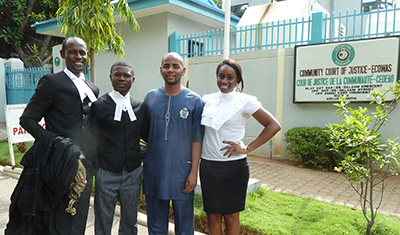Abuja, Nigeria, June 10, 2014–The Committee to Protect Journalists welcomes today’s ruling by a West African regional court, which found that the Gambian government failed to conduct a meaningful investigation into the murder of journalist Deyda Hydara. The ruling is the first ECOWAS case relating to the murder of a Gambian journalist.
Hydara, the founder of the independent newspaper The Point, was shot dead by unidentified assailants as he drove home from his office in the capital, Banjul, on December 16, 2004. Hydara, a regular critic of President Yahya Jammeh’s harsh policies, had received multiple death threats in the months leading up to his death. His murder remains unsolved.
A panel of three justices in the Nigeria-based Economic Community of West African States Court of Justice declared today that Gambia’s National Intelligence Agency, tasked with investigating Hydara’s murder, did not carry out a proper investigation and cited its failure to carry out ballistic tests on the bullets and weapons recovered from suspects. The court said the Gambia’s National Intelligence Agency was “not an impartial body to conduct the investigation” but that there was no evidence linking the Gambian government to the murder. The court awarded US$50,000 to Hydara’s family as compensation for the government’s failure to effectively investigate the murder, and US$10,000 for legal costs.
The court further held that previous ECOWAS rulings against the Gambia in the cases of “Chief” Ebrima Manneh and Musa Saidykhan proved the Gambian government was fostering a climate of impunity which in itself was a violation of freedom of expression in the country. Manneh, a Gambian reporter, disappeared in 2006, and has long been believed to be in government custody, and Saidykhan, a journalist now living in exile, was detained for three weeks in 2006 and allegedly tortured, according to reports. In both cases, the ECOWAS court ruled in the journalists’ favor. The Gambian government has not yet complied with either of the rulings.
“Today’s ruling by the ECOWAS court underscores the responsibility of governments to protect journalists and provide an environment in which the press can operate safely,” said CPJ West Africa Correspondent Peter Nkanga. “It is imperative that the international community ensures the Gambia complies with the court as a first step toward combating the climate of impunity.”
The law firm Aluko & Oyebode, which represents Hydara’s family, brought the lawsuit to the court with support from the Open Society Initiative for West Africa. The court’s ruling is final with no mechanism to appeal, Dindam Killi, lawyer of the Hydara family, told CPJ.
The Gambia, which is part of the 15-member ECOWAS regional bloc, faces no sanctions for failure to comply, Killi told CPJ.
EDITOR’S NOTE: This alert has been modified to reflect that “Chief” Ebrima Manneh disappeared in 2006–not 2007, as previously stated.
